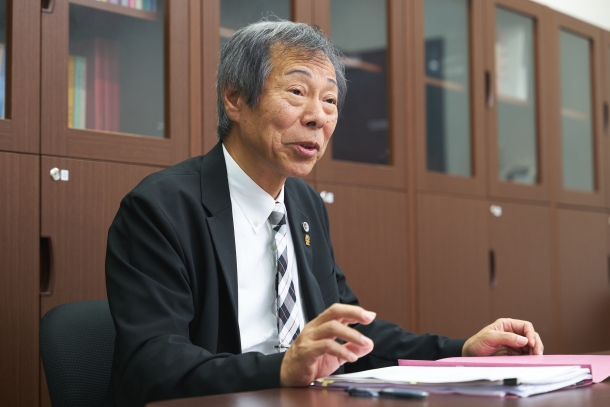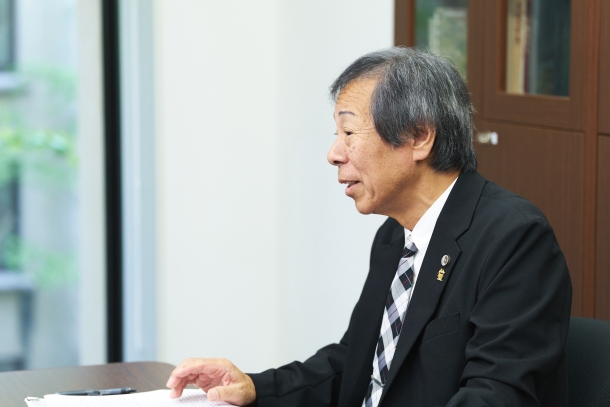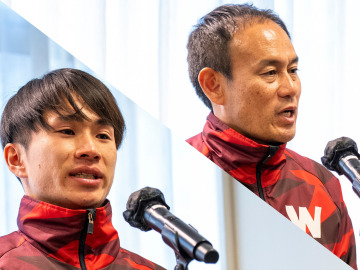
What is the problem with the "cult" that we hear so much about these days? In fact, cases in which students become parties have reportedly occurred at Waseda University. Therefore, we asked Professor Masayuki Tanamura (Faculty of Law), who is an expert on religious issues and director of Waseda Legal Clinic Legal Clinic, why students are often targeted, what problems there are, and specific examples and ways to deal with them. At the end, we will also introduce contact points for help if you have any problems. Let's think about the cults that are lurking around us.
The term "cult" used in this article does not refer to academic usage such as "radical religion that criticizes the mainstream" or "religion that deviates from mainstream culture," but rather to "anti-social, dangerous, and human rights-violating religion." It is used in social usage as "a group of people repeating something". In addition to ``religious cults,'' there are also ``economic and commercial cults'' that defraud money in the name of seminars and study groups, ``political cults'' that masquerades as a group that opposes war and appeals for peace, and ``psychological cults'' that take advantage of people's weaknesses and insecurities.
INDEX
▼Case where the university was actually consulted
▼The reality of cults, their tactics and how to deal with them: “University campuses where anyone can freely enter are ideal targets.”
▼Don't worry about it all by yourself, ask for help right away! List of various consultation counters
Cases in which the university was actually consulted
When do Waseda University students get involved? Let's start by looking at a specific case. “Danger” lurks around us, so please be careful.
Case 1: I thought it was a date...
A male student meets a cute woman on SNS and gradually develops a liking for her through chat. We got excited talking about yoga, and she asked me if I wanted to go to a trial event, so we ended up meeting. On the day, on the way to the venue, I heard for the first time that it was a ``Buddhist experience.'' After arriving, he was surrounded by several people involved, and was so captivated by the atmosphere that he ended up signing a piece of paper that was handed to him. It seems that the paper was a registration form, and I will receive a bill for the membership fee at a later date.
Case 2: I intended to help my friend, but instead I was taken in...
A student who entered the university with the intention of becoming a lawyer persuades his friend to save him from being taken into a cult. However, he was eventually persuaded to join the cult. The student's mother contacted the university for advice, and the faculty in charge of the student met with her and her mother, but in the end, the student submitted a notice of withdrawal and left home.
Case 3: I thought you were a kind senior...
A student who is worried about things like a rift between his parents or his future career path is approached by a friendly-looking student in Student Lounge who asks, ``Would you be willing to help me with a survey for my graduation thesis?'' As we talked, she kindly asked, ``You don't seem to be doing well, but are you worried?'' I went straight to the coffee shop to hear about my worries, and we exchanged contact information, but after that, I realized that the religion was persistent. The solicitation has begun.
Case 4: I thought it was student club event...
new students from a rural area was recruited with comments such as, ``If you don't join student club, you won't receive information on course registration,'' and ``Our student club has over 100 people, so it's safe and fun,'' and they exchanged contact information. Later, just as my senior colleagues had taken me to see around Tokyo, I was taken to a religious organization's hall, where I was forcibly encouraged to apply for membership and to subscribe to a newspaper.
Many people think that they will never be fooled, but why does this happen? Also, how can I protect myself? This time, we would like to hear from Professor Masayuki Tanamura (Faculty of Law), who is an expert on religious issues.
The reality of cults, their methods and how to deal with them: ``University campuses where anyone can freely enter are easy targets.''

Masayuki Tanamura. Professor at Waseda University Faculty of Law, lawyer (Daini Tokyo Bar Association), Tokyo Family Court Mediation Committee member, Counselor, Tokyo Family Court Committee member, Legislative Council member, former president of the Japanese Family Society and Law Society, etc. Specializes in civil law and has been involved in family and religious issues for many years.
--What are the specific dangers of the "cult problem"?
One thing that cults have in common is mind control and brainwashing of their targets...in short, they stop their actions, and thoughts, and turn them into puppets. In turn, the victim may unknowingly join the perpetrator's side and increase the number of victims just like him/her.
I think many students think that they would never make such a mistake. However, cults are very organized and clever. Through a detailed process, they completely transform the other person, from their personality to their way of thinking. In other words, a cult is one in which people stop thinking to the point where they don't realize that they are being victimized, or even think that something is wrong.
The process also has several stages.
- Fundamental human rights such as freedom of religion, spiritual freedom, personality rights, freedom of action, and freedom of thought and belief are violated, making it impossible to act or think freely.
- Being economically exploited through fraudulent business practices and illegal fundraising activities such as exorbitant donations, and not only becoming a victim themselves, but also reproducing economic damage by turning to the perpetrators.
- Unfair interference in marriage, love, sexual self-determination, family relationships, etc., and freedom of marriage, love, and family relationships is violated.
- Due to the closed-door nature and fanaticism, they are subjected to violence, abuse, corporal punishment, harassment, etc. by their leaders, and are exposed to situations from which they cannot escape.
- Once they are taken in, there is a risk that they will turn to anti-social activities such as mass suicide and criminal acts.
Even if you are taken in, it does not mean that ``if you can leave the group, that is the end.'' The sense of loss is greater than they imagined, as they lose their daily support and dependence, and in many cases they end up returning to the group. This is similar to a drug problem; no matter how hard you try to quit, you can't bear the negative side of quitting, so you end up joining and leaving the group repeatedly.
--I heard that university students are easy targets, but why?
The purpose of a cult is to gather people and raise money using religion, politics, and psychology as tools. In terms of ``gathering people,'' university campuses, which anyone can freely enter, are ideal targets. Moreover, students come from all over Japan and around the world, prioritizing encounters and friendships rather than being suspicious of others.
Furthermore, while the position of ``student'' is full of expectations, hopes, and dreams, there is also anxiety and often isolation. That's the goal. For example, if you are new students, you will be able to ``introduce student club'' or ``you will be given advice on course registration,'' and if you are a job-hunting student, you will have a ``job-hunting seminar'' or ``you can listen to what your seniors have to say.'' Cults draw in people according to their needs and interests.
Especially in the case of Waseda University, there are many students and Alumnus (alumni), so it is easy to create points of contact and commonalities with others, such as, ``I am a Waseda student too'' or ``I am from Waseda.'' And if they can attract one Waseda student, they can recruit several more from there. It's the same idea as pyramid schemes and multi-level marketing.
Also, for cults who want to collect not only people but also money, it is important to know what kind of work Guardian do and how much assets the family has. In fact, they skillfully obtain such guardian information and rank them. For that reason, Waseda has name value and social trust. Waseda University students are likely to be targeted as ``future leadership candidates'' due to their academic background.
--Earlier, you mentioned that "the methods of recruitment and mind control are systematic and clever. There is a detailed process." Among them, what kinds of techniques are becoming more common recently?
After all, it's SNS. Since there have been fewer opportunities to meet face-to-face in the past three years due to the coronavirus pandemic, they searched for target candidates using keywords such as "#Spring to Waseda," and after exchanging comments and DMs, they invite target candidate to Cult's online salon. This will lead to recruitment and real encounters.
From the cult's point of view, SNS-based tactics have the advantage of being less likely to be noticed by Guardian or friends around them. That's why it is important for students to be equipped with information on how to cope, how to protect themselves, and what problems are occurring in society. This is the same with unscrupulous business practices.

There are also many other activities that are held under the guise of being student club, with themes such as ``questionnaires'', ` Student Clubs'', ``course consultations'', ``study abroad consultations'', ``study sessions'', ``volunteers'', ``SDGs events'', ``job hunting seminars'', and ``self-development seminars''. It is difficult to distinguish these from healthy student club activities and regular organizations.
Particularly recently, there are many cases where it takes more than a year to carefully build relationships before gaining trust, making it increasingly difficult to discern which organizations are legitimate and which are not.
In any case, after creating an opportunity, they will encourage you to exchange contact information on SNS such as LINE and participate in group chats. The next step is to have them participate in welcome parties, sports activities, study sessions, etc., and build trust and interpersonal relationships through interaction with seniors and classmates.
From there, they take a step-by-step approach that invites them to events, seminars, lectures, training camps, etc. hosted by groups or groups. Once they are indoctrinated as members of a group, they are then used for fundraising activities such as recruiting new members, making donations, and selling goods.
--Are there any effective measures to deal with this?
As students themselves, please keep the following four points in mind.
- Even if a stranger approaches you and seems kind, you don't respond. If they are persistent, have the courage to say no. When receiving solicitations on SNS, be sure to check who sent you and for what purpose, and do not respond carelessly.
- If you receive a solicitation from an organization or individual you don't know, check online to see what kind of activities that organization or group is doing and make sure it is a safe and secure organization. At that time, check other search results as it may be a well-crafted website.
- As a general rule, do not share personal information such as address, name, contact information, school, family relationships, etc. Also, decline if the offer involves taking you somewhere else or introducing someone else.
- If you receive persistent calls or intrusions, please consult the office of your faculty/graduate school or Student Affairs Section. Alternatively, consult with a consultation center such as the National Liaison Committee for Lawyers Against Spiritual Transactions or Houterasu and seek appropriate guidance and advice.
What I want you to be especially aware of is 4. In any case, don't handle it alone. Also, if your friend is suffering from a cult problem, you may want to help them, but don't forget to rely on experts in that case as well.

In the case of Aum Shinrikyo in the past, a person who tried to force a friend to leave the group was instead taken in and eventually became an executive, a case in which mummifiers became mummies. On the cult side, there is a detailed manual that says, ``If something comes up like this, how to respond.'' It is the domain of experts to deal with such matters, so please make sure to rely on the appropriate consultation center.
Regarding 3, if your address is known, you may cause trouble to your family and neighbors by visiting them directly or following them around. If you live alone, you have the option of moving, but if you live with your parents, it is not so easy.
For a while, the cult problem had subsided, but since last year, various problems related to the former Unification Church have been attracting attention, and light has also been shed on other problems such as the "religious second generation" (*). In this way, the important thing is to have a continuous interest, not just a passing moment. Sharing accurate knowledge and information helps prevent damage.
(*) People who are born to parents or families who believe in a specific religion and are made to follow that religion from birth or childhood.
Interview and text: Naoto Oguma (Graduated from School of Letters, Arts and Sciences II in 2002)
Photography: Nanako Ono
Don't worry about it all by yourself, ask for help right away! List of various consultation counters
If you have a problem, please do not try to solve it alone, but immediately rush to the help desk. The closest point of contact is the office of your faculty/graduate school, but we will introduce the following as other points of contact. In addition, Waseda Weekly has introduced five checkpoints to prevent cults in a past article, so please check them out as well.
Student Affairs Section (Student Life 110)
If you have any troubles, incidents, accidents, etc. related to your student life, please feel free to contact us, no matter how trivial it may be.
Health Support Center Student Counseling Room (Legal Counseling)
Twice a month, we offer free legal consultations from lawyers at Waseda Campus Health Support Center. Advance registration is required.
Waseda Legal Clinic (Building No. 28)
This is a law office attached to Waseda University. Anyone affiliated with Waseda University can consult free of charge. Advance registration is required.
Hoterasu Dial for psychic marketing, etc.
This is a free consultation desk for the Japan Legal Support Center, which is under the jurisdiction of the Ministry of Justice. There is no need to apply in advance, and there is also an email consultation desk.
National Liaison Committee for Lawyers Against Spiritual Transactions
This is a network organization made up of lawyers that educates people about the reality of damage caused by inspirational marketing and its risks, and provides free consultation services (phone and email).
[Next Focus Preview] “School Festival Special” to be released on October 30th (Monday)






![[Save version] Map of the four main campuses](https://www.waseda.jp/inst/weekly/assets/uploads/2025/09/17cb2975123fc5103172ef60bd98608d-610x458.jpg)

